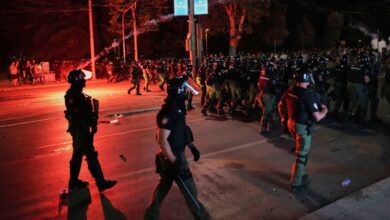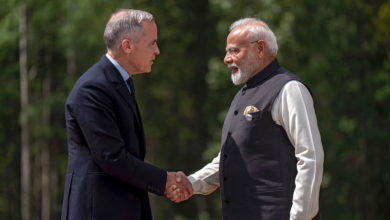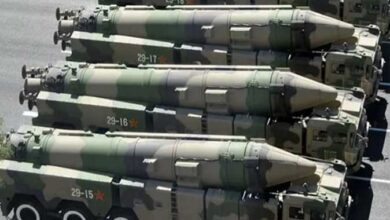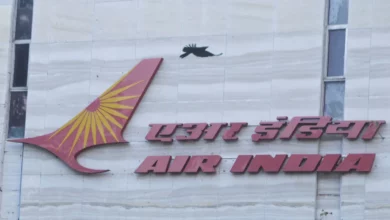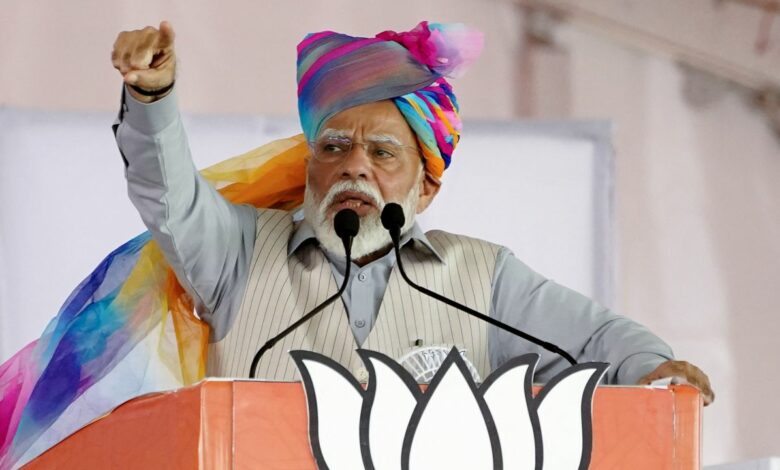
India’s Prime Minister Narendra Modi has a new message for supporters on the campaign trail: God has chosen him.
“I’m convinced that God has sent me for a purpose, and when that purpose is finished, my work will be done,” he told local news channel NDTV in an interview last week. “This is why I have dedicated myself to God.”
Modi continued: “God doesn’t reveal his cards. He just keeps making me do things.”
Since assuming power in 2014, Modi and his Bharatiya Janata Party (BJP) have promoted a strident brand of Hindu nationalism in a country where about 80% of the population are followers of the polytheistic faith.
And while he has used such language in the past, his message of being a leader chosen by God has become much more apparent as attempts to win a third consecutive five-year term in power.
Throughout India’s mammoth weeks-long national election, which declares results on June 4, Modi has given multiple media interviews and speeches that echo the comments made to NDTV.
He has taken on the persona of an openly devout Hindu, said Subir Sinha, Director of the South Asia Institute at SOAS University of London. This, he added has “rallied his base who feel pride in such religiosity.”
India is a deeply religious country. But historically its post-Independence leaders have remained publicly secular, in part to avoid being seen to pander to any one side in a nation with a long history of inter-religious violence.
“(He is) the first prime minister, they say, to be unashamed about this faith,” Sinha said.
When he first contested elections a decade ago, Modi chose India’s spiritual capital Varanasi as his constituency, making the ancient city the perfect backdrop to meld his religious and political ambitions.
“Mother Ganga has called me to Varanasi,” Modi said at the time, referring to the holy Ganges River, considered to be the body of the Hindu deity Ganga by many followers of the faith.
Standing on its banks earlier this month, Modi made another reference to his perceived divinity.
“Until my mother was alive, I had believed that perhaps my birth was a biological one,” Modi told CNN affiliate CNN News-18. “But after her death, when I look at my life experiences, I’m convinced that God has sent me here.”
God has, Modi said, made him “nothing but an instrument.”
Modi’s grandest display of divinity was on display in January this year, when he consecrated the Ram Mandir in Ayodhya, a controversial Hindu temple that was built on the site of a destroyed mosque.
Billboards celebrating the temple’s opening featured an image of Hindu deity Ram alongside Modi’s face, with the leader of his BJP even dubbing the prime minister “The King of Gods.”
Modi fasted for 11 days in a purification ritual before the event and visited temples across the country, performing customs sacramental to India’s majority faith. He publicly called himself “an instrument” of Lord Ram, picked by the divine to “represent all the people of India.”
At the consecration, Modi presided over the “Pran Pratishtha” – the unveiling of the much-anticipated Ram idol – taking on a role typically reserved for priests.
During the election Modi has also sparked a row over hate speech when he accused Muslims – who have been part of India for centuries – of being “infiltrators,” and echoing a false conspiracy voiced by some Hindu nationalists that Muslims are displacing the country’s Hindu population by deliberately having large families.
It ignited widespread anger among Muslim leaders and opposition politicians and calls for election authorities to investigate. BJP party spokespeople subsequently said Modi was talking about undocumented migrants. The election commission has asked the BJP to respond to the allegations.

